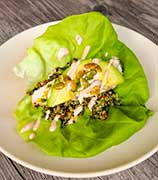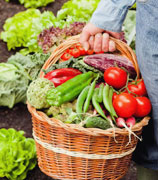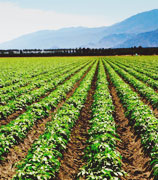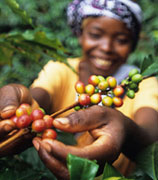
Sustainability Goals & Practices
Sustainability is an important aspect of Bruin Plate. Our goal is to integrate sustainable operations and outreach into all aspects of the restaurant – particularly through food sourcing and waste management.
Supporting sustainable food systems means we choose to purchase and prepare foods that support the long-term health of people and the planet by understanding and improving the way our food is grown or raised, harvested, transported, prepared, and eaten.
Within the UCOP Food Sustainability Policy, each campus foodservice operator is to set a goal of procuring 20% of foods sustainably by 2020. Dining Services continues to expand our sustainable food purchase program, but at Bruin Plate we set a goal of meeting or exceeding the 20% sustainable food policy seven years early.
For the 2013/2014 academic year, Bruin Plate surpassed the 20% goal, sourcing more than 30% of all food purchases as sustainable. Some of our sustainable food purchases include:
- Fair Trade Certified coffee from Dillanos Roasters
- Fair Trade Certified and USDA Organic tea from Choice Organic Teas
- Locally and humanely raised poultry from Mary’s Chickens
- Sustainable seafood including tilapia, wahoo, sockeye salmon, and trout — coming from Monterey Bay Aquarium Seafood Watch Guide "Good Choices" or "Best Alternatives" lists
- Locally grown salad greens from Scarborough Farms
- Locally grown produce sourced through Family Tree Produce
- Humanely raised and handled eggs coming from cage-free chickens
In addition, tableware is a composite of melamine and bamboo, and napkin holders are made of bamboo — a rapidly renewable material.
In November 2014 the U.S. Green Building Council certified Bruin Plate and the Sproul Complex as LEED Gold construction.
As a campus, we have a goal of sending zero waste to landfill by 2020 (diverting 100% of our waste to recycling, composting, etc.). Dining Services continues to do our part by continuing our pre- and post-consumer composting program to help reduce our waste going to landfill. We'll also continue to work with our vendors to reduce the amount of packaging used to deliver products to the restaurant.
Bruin Plate was named the "2014 Best Practice Award Winner – Sustainable Food Service" in the tenth annual Higher Education Energy Efficiency and Sustainability Best Practice Awards competition. Click to Read Article
Learn More About...

Menus of Change
This initiative leverages the unique position of universities to advance these types of life-long food choices among students—who will soon be parents and adult decision-makers—by connecting a diversity of insights from academic programs, dining services, and athletics (performance dining). The purpose of MCURC is to create a culture of sharing and innovation within and among colleges and universities using the Menus of Change principles in their campus dining operations, and to develop a research agenda related to those principles.

Locally Produced Food
Local food is grown, raised, harvested, or processed within a limited number of miles from its consumer. There are no official standards that define "local food." Organizations supporting sustainable food practices often set their own guidelines – typically 500 miles or less.
Local food travels a relatively short distance from farm to table, resulting in fresher produce picked closer to its peak ripeness. Shorter distances also reduce the use of fossil fuels and greenhouse gas emissions. In addition, local economies directly benefit from the sales of locally-produced foods when farmers spend their earnings in their local communities.

Environmentally Sound Food
Environmentally sound food is produced or harvested in a way that minimizes harm to the environment. This includes products that are grown without synthetic fertilizers or pesticides, farmed to protect waterways, and harvested to preserve biodiversity. Environmentally sound food practices also reduce greenhouse gas emissions from food production by preventing deforestation and decreasing the consumption of meat and processed goods.

Humanely Raised Food
Humanely-sourced food is the result of the ethical treatment of farm animals, from birth through slaughter. Cages, crates, or stalls are not allowed in the facilities of certified humane producers. Animals are also minimally handled to reduce stress, which has been found to produce better quality meat. In addition, farm animals raised humanely receive a healthy diet without added antibiotics or hormones. Any animal products, ranging from meat to butter to eggs, can be humanely produced.

Fair Trade Food
Fair trade products — often of international origin — are produced and sold in an ethical manner based on a third-party certification. Examples of such products are: coffee, tea, sugar, honey, herbs and spices, bananas, beans and grains, flowers, and make-up. Fair trade standards require that producers be paid a guaranteed minimum price and that working conditions are safe and wages are reasonable. In addition, most fair trade product certifications involve environmental requirements that ensure products are grown or produced in a way that minimizes their impact on the environment.